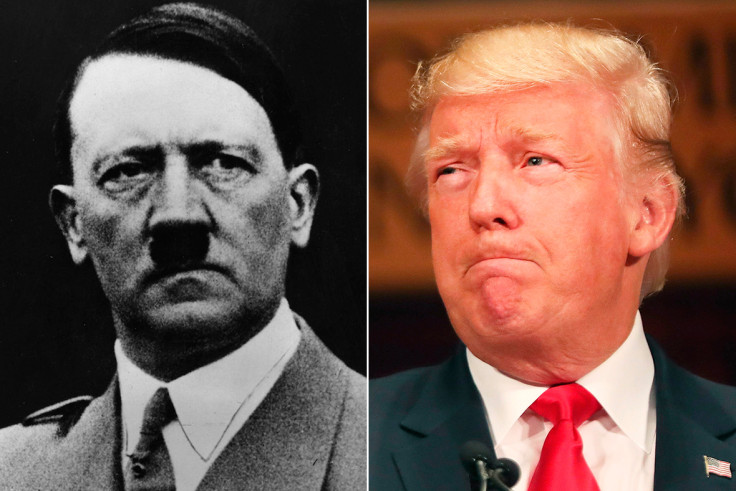How similar are Donald Trump and Adolf Hitler?
Trump is capitalising on a longing for charismatic leadership by 'othering' minority groups.

At the Emmy awards ceremony on Sunday night, Transparent creator Jill Soloway compared Donald Trump to Adolf Hitler. Many others have made the same comparison before her: the front page of the Philadelphia Daily News last December; the Council on America-Islamic Relations; the Holocaust survivor Zeev Hod.
The focus of these comparisons has been on the way Trump drums up support by blaming and denigrating groups who do not fit the imagination of a masculine, Christian, hard-working, and essentially white American ideal-type: Mexicans, Muslims, gay and transgender people, and disabled people, to name a few of the most obvious targets.
This comparison contains a kernel of truth, yet it could be applied to many other people besides Trump. Similar sentiments are articulated by leaders of resurgent right-wing parties in Europe, from Frauke Petry to Marine Le Pen.
More importantly, what Soloway calls the 'Othering' of minority groups is today also embraced by large swathes of apparently mainstream conservatives, as debates both before and after the Brexit Referendum in the UK have made very clear. If we look beyond formal politics to social media, Trump's rhetoric looks anything but unique; in fact, it is in danger of becoming mainstream.
So why compare Trump with an individual who was responsible for the Holocaust, and many millions of war dead between 1939 and 1945? Much as we may dislike his politics, Trump is proposing to stop immigration, not to commit genocide; and while he is proposing a more aggressive military stance against Isis and its backers, he is not, as far as one can tell, proposing World War Three.
What makes the comparison between Hitler and Trump so poignant is not just the rhetorical marginalisation of groups, lifestyles or beliefs, but the fact that both men represent their personal character as the antidote to all social and political problems.
Neither Hitler nor Trump campaign on specific policies, beyond a few slogans. Instead, both promise a new vision of leadership. They portray the existing political systems as fundamentally corrupt, incompetent, and, most importantly, unable to generate decisive action in the face of pressing problems.
Both use their personal biographies – or rather, the highly edited accounts of their personal biographies they present to the media – to conjure up a new style of politics, which is based neither on expertise nor on detailed policy proposals. Instead – they suggest – their own personal 'struggle' shaped them into – supposedly – authentic leaders, capable of overcoming adversity through sheer force of character. In this scenario, democracy has less to do with representative institutions than with a leader who is intuitively 'in tune' with the sentiments of the people.
Hitler's famous autobiography was called 'My Struggle' for a reason. And it is a book we'd do well to remember. 12.5 million copies were distributed in the Third Reich, and this supposedly difficult-to-read book continues to enjoy surprising popularity in many countries throughout the world; in India, it has been on bestseller lists for many years, and is widely used as a textbook on leadership in Business Schools.
Read more: How to read Adolf Hitler's Mein Kampf
This should give us pause for thought. Like Hitler, Trump is capitalising on a longing for charismatic leadership, to which even highly developed Western democracies seem very susceptible when democratic structures fail to deliver all the desired outcomes. No Western democracy currently faces problems on the scale of those Germany grappled with before 1933. And yet, there is a very real sense amongst a large part of the population that they have not been on the 'winning side' for a long time.
The gap between rich and poor is getting wider, and in the process, the classical attributes of political leadership – education, expertise, eloquent speeches – have come to be seen not as problem-solving strategies, but as the identity markers of a social elite who are looking after their own interests only.
Even where new policies on healthcare, education, or job creation achieve their goals, they are not popular, because they are tinged with that smell of elitism that makes many ordinary people not feel valued by the political classes. Trump has not been the first demagogue to capitalise on such sentiments, and he will not be the last. If elected, we will not see a resurgence of National Socialism. Trump is, nevertheless, a symptom of a fundamental problem with our democratic system, which we seem utterly unable to fix.
Maiken Umbach is a Professor of Modern History and Faculty Research Director at the Faculty of Arts, University of Nottingham
© Copyright IBTimes 2025. All rights reserved.




















